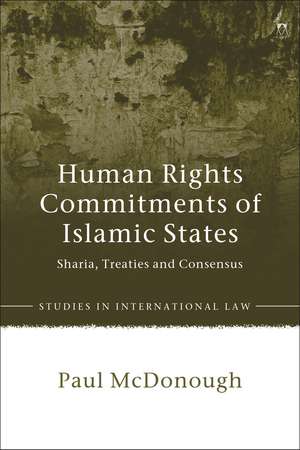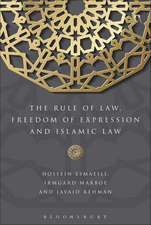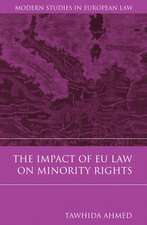Human Rights Commitments of Islamic States: Sharia, Treaties and Consensus: Studies in International Law
Autor Paul McDonoughen Limba Engleză Paperback – 27 iul 2022
| Toate formatele și edițiile | Preț | Express |
|---|---|---|
| Paperback (1) | 258.51 lei 6-8 săpt. | |
| Bloomsbury Publishing – 27 iul 2022 | 258.51 lei 6-8 săpt. | |
| Hardback (1) | 448.39 lei 3-5 săpt. | +31.17 lei 6-12 zile |
| Bloomsbury Publishing – 23 dec 2020 | 448.39 lei 3-5 săpt. | +31.17 lei 6-12 zile |
Din seria Studies in International Law
- 30%
 Preț: 598.45 lei
Preț: 598.45 lei - 30%
 Preț: 570.51 lei
Preț: 570.51 lei - 34%
 Preț: 512.30 lei
Preț: 512.30 lei - 34%
 Preț: 511.07 lei
Preț: 511.07 lei - 21%
 Preț: 275.26 lei
Preț: 275.26 lei - 18%
 Preț: 297.20 lei
Preț: 297.20 lei - 23%
 Preț: 249.26 lei
Preț: 249.26 lei - 30%
 Preț: 571.24 lei
Preț: 571.24 lei - 34%
 Preț: 509.52 lei
Preț: 509.52 lei - 30%
 Preț: 573.05 lei
Preț: 573.05 lei - 30%
 Preț: 538.77 lei
Preț: 538.77 lei -
 Preț: 448.39 lei
Preț: 448.39 lei - 30%
 Preț: 571.34 lei
Preț: 571.34 lei - 30%
 Preț: 1138.79 lei
Preț: 1138.79 lei - 28%
 Preț: 406.31 lei
Preț: 406.31 lei - 21%
 Preț: 270.97 lei
Preț: 270.97 lei - 30%
 Preț: 570.43 lei
Preț: 570.43 lei - 30%
 Preț: 836.82 lei
Preț: 836.82 lei - 14%
 Preț: 570.43 lei
Preț: 570.43 lei - 30%
 Preț: 512.37 lei
Preț: 512.37 lei - 30%
 Preț: 511.14 lei
Preț: 511.14 lei - 30%
 Preț: 954.11 lei
Preț: 954.11 lei - 30%
 Preț: 572.47 lei
Preț: 572.47 lei - 30%
 Preț: 603.73 lei
Preț: 603.73 lei - 30%
 Preț: 779.50 lei
Preț: 779.50 lei - 14%
 Preț: 837.54 lei
Preț: 837.54 lei - 30%
 Preț: 898.78 lei
Preț: 898.78 lei - 30%
 Preț: 576.40 lei
Preț: 576.40 lei - 30%
 Preț: 719.91 lei
Preț: 719.91 lei - 30%
 Preț: 599.66 lei
Preț: 599.66 lei - 12%
 Preț: 233.46 lei
Preț: 233.46 lei - 30%
 Preț: 779.50 lei
Preț: 779.50 lei - 30%
 Preț: 570.43 lei
Preț: 570.43 lei - 14%
 Preț: 779.09 lei
Preț: 779.09 lei - 30%
 Preț: 540.38 lei
Preț: 540.38 lei - 30%
 Preț: 573.86 lei
Preț: 573.86 lei - 30%
 Preț: 542.02 lei
Preț: 542.02 lei - 28%
 Preț: 500.25 lei
Preț: 500.25 lei - 14%
 Preț: 574.92 lei
Preț: 574.92 lei - 30%
 Preț: 540.48 lei
Preț: 540.48 lei - 30%
 Preț: 778.12 lei
Preț: 778.12 lei - 30%
 Preț: 570.43 lei
Preț: 570.43 lei - 30%
 Preț: 515.24 lei
Preț: 515.24 lei - 30%
 Preț: 573.70 lei
Preț: 573.70 lei - 30%
 Preț: 720.23 lei
Preț: 720.23 lei - 30%
 Preț: 784.00 lei
Preț: 784.00 lei - 22%
 Preț: 571.24 lei
Preț: 571.24 lei - 14%
 Preț: 779.09 lei
Preț: 779.09 lei
Preț: 258.51 lei
Preț vechi: 331.72 lei
-22% Nou
Puncte Express: 388
Preț estimativ în valută:
49.47€ • 52.90$ • 41.24£
49.47€ • 52.90$ • 41.24£
Carte tipărită la comandă
Livrare economică 17 aprilie-01 mai
Preluare comenzi: 021 569.72.76
Specificații
ISBN-13: 9781509943104
ISBN-10: 1509943102
Pagini: 296
Dimensiuni: 156 x 234 mm
Greutate: 0.41 kg
Editura: Bloomsbury Publishing
Colecția Hart Publishing
Seria Studies in International Law
Locul publicării:London, United Kingdom
ISBN-10: 1509943102
Pagini: 296
Dimensiuni: 156 x 234 mm
Greutate: 0.41 kg
Editura: Bloomsbury Publishing
Colecția Hart Publishing
Seria Studies in International Law
Locul publicării:London, United Kingdom
Caracteristici
First systematic examination within a single analytical framework of these human right commitments
Notă biografică
Paul McDonough is lecturer in law at Cardiff University.
Cuprins
Introduction I. Background A. Methodology B. Plan of Chapters 1. The History of the CaliphatesI. The First Islamic State II. Rule by the Prophet A. The Emergence of Islam B. The City-State of Medina III. The Rashidun Caliphate IV. The Dynastic Caliphates A. Umayyad Rule B. Post-Umayyad Caliphates 2. Islamic Law, International Law and Human Rights I. Islamic law A. Sources of Law B. Proofs - Reasoned Law C. Usul al-fi qh - Methods of Discovering Islamic Law D. Purposive Law E. Applying the Law II. Islamic Law and International Law A. International Human Rights Law B. SiyarC. Siyar and International Law III. The Islamic Law of Human Rights A. Human Rights Principles of Sharia B. Human Rights According to Islamic Law C. Compatibility of Islamic Law and International Human Rights 3. Islamic States I. The Caliphate A. Theory of the Caliphate B. The Caliph and the Ulama C. Legacy of the Caliphate II. Ideas of an Islamic State A. Islamic Revivalism B. The Modernist View C. Islamism D. Islamic Constitutions III. Islamic States in the International System A. Islamic International Law B. Islamic States and International Law 4. Islam, Constitutions and Democracy I. Principles of Islamic Governance A. The Divine Right to Rule B. Just Rule C. Shura II. Assigning the Governing Power A. Sharia and Constitutions B. Choosing a Ruler III. Dividing the Governing Power A. Separating Civil from Religious Authority B. Dividing the Executive Power C. Legislation IV. Courts and Constitutional Interpretation V. Conclusion Appendix 5. Islamic Law and International Law in Islamic Constitutions I. Limiting Legislation through Sharia A. Sharia as a Source of Legislation B. Repugnancy Clauses 4C. Defining the Limit II. Sharia in Secular and Religious Courts A. Islamic Law in the Hierarchy of National Law B. Dividing Jurisdiction: Sharia Courts and Civil Courts III. The Integration of Islamic Law and National Law 6. Islamic States and the UN Human Rights Treaties I. The International Bill of Rights A. Treaty Partners' ObjectionsB. A Middle Ground: Pakistan's ICCPR Reservations II. UN Human Rights Treaties III. The Convention on the Elimination of All Forms of Discrimination against Women (CEDAW) A. General Reservations and Article 2 Reservations B. Article 9 C. Article 15 D. Article 16 E. Objections to Reservations Regarding Articles 2, 9, 15 and 16 F. Patterns of CEDAW Reservations and Objections IV. The Convention on the Rights of the Child (CRC) V. Conclusion 7. Islamic International Human Rights Law I. An Islamic Human Rights Consensus II. Human Rights Commitments of Islamic States:A Three Layer Analysis A. Sharia and International Human Rights Treaties B. Sharia and International Islamic Instruments C. Islamic and International Human Rights Instruments III. Reconciling Islamic Law and International Human Rights Law A. Flexibility of Islamic Law B. Interpreting Sharia for Islamic International Law IV. Conclusion























